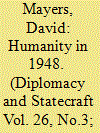|
|
|
Sort Order |
|
|
|
Items / Page
|
|
|
|
|
|
|
| Srl | Item |
| 1 |
ID:
160227


|
|
|
|
|
| Summary/Abstract |
This analysis probes the interwoven careers and lives of two distinguished American diplomats, John Paton Davies, Jr. and George Frost Kennan. These Foreign Service officers, who rose to prominence in the years immediately after the Second World War, were embroiled in the formulation and implementation of controversial policy during the early Cold War. The experience of Davies and Kennan illustrates the domestic hazards that have dogged American foreign policy-making even into the present. Yet the focus here is on their friendship—a subject hitherto little examined in the scholarly literature—its connexion to the evolution of their policy recommendations, its steadying power in moments of moral and personal crisis, its tempering effect on failure. The assessment also draws on a notable work of fiction, Wallace Stegner’s 1987 Crossing to Safety, to consider the ineffable nature of friendship itself.
|
|
|
|
|
|
|
|
|
|
|
|
|
|
|
|
| 2 |
ID:
188624


|
|
|
|
|
| Summary/Abstract |
Agnes Smedley is one of the more fascinating figures in the history of Sino-American relations. Albeit once the subject of two excellent biographies, and alternately celebrated and reviled in the United States, she nevertheless remains a relatively obscure figure. As the Sino-American relationship now occupies a crucial place in international politics, it is worthwhile to revisit the career of this ardent feminist and political pilgrim. Amidst the maelstrom of revolution and Sino-Japanese war, she professed faith in a better future. Both her perspicacity and illusions were striking, as she sought to discern – and explain to Americans – the churning reality of her preferred homeland, China. Questions confronting Smedley still linger in the twenty-first century as Beijing and Washington try to accommodate each other’s ambitions and rival conceptions of human society.
|
|
|
|
|
|
|
|
|
|
|
|
|
|
|
|
| 3 |
ID:
141961


|
|
|
|
|
| Summary/Abstract |
By approving prohibitions on genocide and embracing the Universal Declaration of Human Rights (UDHR), the United Nations in 1948 sustained a theory premised on the centrality of people—both in their collective and individual capacities—that enjoyed primacy over the claims of the sovereign state. This affirmation of human rights dovetailed with the UN’s earlier endorsement of the Nuremberg principles with their emphasis on personal accountability. The melding of privileges and responsibilities gestured toward, although it did not fully encompass, that philosophical line strenuously espoused at the time by the eminent legal theorist, Hersch Lauterpacht: the state is not a sanctified end but merely the custodian of the welfare and ultimate purpose of human beings. This analysis examines the Genocide Convention and the UDHR and brings into conversation their drafting histories, politics, and diplomacy. It traces the saga of two seminal documents and their tandem fates in Cold War America. The collectivist project of the Genocide Convention and the individualistic emphasis of the UDHR are usefully placed in the same analytical frame, something seldom done in the literature that deals with human rights and norms-making of the late 1940s and their interaction with Cold War dilemmas. As peoples and governments pick their way through the hazards of the twenty-first century, it is exigent—for the sake of upright bearing—to stay mindful of the orientation prescribed in the Genocide Convention and the UDHR.
|
|
|
|
|
|
|
|
|
|
|
|
|
|
|
|
| 4 |
ID:
088125


|
|
|
|
|
| Publication |
2009.
|
| Summary/Abstract |
American policy toward Germany in the years before Pearl Harbor can be approached from any number of angles. A rich literature already exists that emphasizes the geopolitical dimension of the German-U.S. relationship, as well as its economic and ideological complexities. I shall here explore an interpretative line that has been less fully developed in the historiography, namely, the viewpoint of U.S. diplomats posted in Berlin. Their experience in the 1930s throws into vivid relief the dilemmas posed by the Third Reich to FDR's America and its equivocal response.
|
|
|
|
|
|
|
|
|
|
|
|
|
|
|
|
|
|
|
|
|